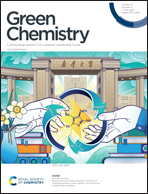High pressure switchable water: an alternative method for separating organic products from water†
Abstract
Biomass conversion to organic products is expected to be a core technology for the future sustainable society. Still, published studies show that the energy cost and environmental impact of making organic products from biomass are often worse than making those products from fossil fuels. The problematic step in biomass conversion is the removal of water. Unless the environmental and energetic costs of separating water from organic products can be lowered, bio-derived products will struggle to be greener and cheaper than fossil-derived products. We propose a new method for separating organic products from water: high pressure switchable water (HPSW). HPSW is a process that combines two known phenomena: CO2 expansion of liquids (CXL) and CO2-switchable water (SW). HPSW takes advantage of the benefits of changing the polarity of organic liquids at high CO2 pressures and the repulsive amine-solute interactions that occur after SW amines are exposed to CO2, both contributing to the removal of the organics from water. Each process alone can trigger the separation of some organics from water, but individually they are not efficient for removing hydrophilic organic solutes. We hypothesised that CXL and SW, if performed simultaneously, would act synergistically and promote more efficient and cleaner separations. For test mixtures of acetone and water, we demonstrated that several amine ionogens could promote phase separation of the acetone from water at lower pressures than CXL alone. 2,6,10-Trimethyl-2,6,10-triazaundecane (TMTAD) was one of the best amines tested, decreasing the separation pressure to 3 bar of CO2 compared to 30 bar without an ionogen. In addition, 93% of the initial TMTAD added to the mixture was recovered using reverse osmosis (RO). If HPSW can reduce the energy consumption of separations, the current separation issues faced by the biomass conversion sector might be overcome.

- This article is part of the themed collection: 2021 Green Chemistry Hot Articles


 Please wait while we load your content...
Please wait while we load your content...